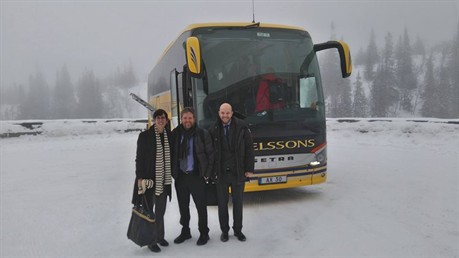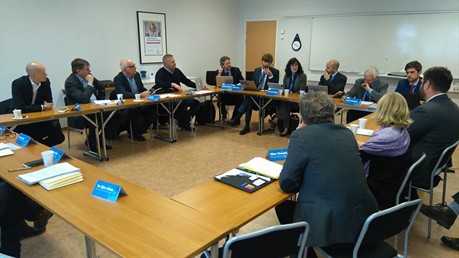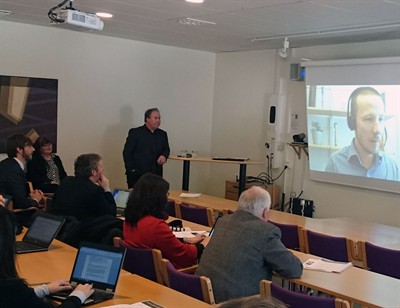OECD on Study Mission
On 21-26 February, a team from the Organisation for Economic Cooperation and Development (OECD) visited four regions in northern Sweden as part of an in-depth study. The ongoing OECD study includes 14 regions in the Northern Sparsely Populated Areas (NSPA) in Sweden, Finland and Norway. The study is carried out by this expert team together with other study groups, provided with questionnaires and data for an overall analysis of the challenges and opportunities the different regions and NSPA are facing, to further manage to create proposals for sustainable growth.
José Enrique Garcilazo, head of the OECD's rural unit, also leading the OECD study of the NSPA, and Chris McDonald and Abel Schuman, analysts from the OECD, plus three OECD experts, David Freshwater from the University of Kentucky and Marie- Chantal Girard and Stephane Pronovost from a Canadian national development agency for the Quebec region, participated in the study between 21-25 February. The Canadian participants were invited by North Sweden, to exchange experiences due to their similar conditions and challenges with sustainable growth.

Road Tour" in-depth knowledge of the four northern Swedish regions
The study tour had its point of departure on Monday morning in Åre in Jämtland-Härjedalen, with a discussion of the tourism industry, opportunities and challenges, and then continued to Trångsviken for a meeting with local and regional business actors concerning entrepreneurship. The journey continued through Västernorrland and Västerbotten on Wednesday night. The final stop was in Norrbotten and Piteå for an OECD joint seminar with all 14 NSPA regions at Pite Havsbad on Thursday. The seminar also included Europaforum Northern Sweden and the European Commission's visit to the region. Friday was the final day of the one-week tour in Norrbotten before the OECD team departed from Luleå.
The objective of the OECD is to obtain complementary and immersive images related to the main themes highlighted in the study: infrastructure and accessibility, innovation and business development, and demographic challenges regarding skills and community service. Meetings with local and regional players in politics, academia and business were carried out throughout the week, and examples of activities related to regional development such as science centres, e-health, research facilities and educational activities and more were demonstrated.
A wide range of meetings and workshops with people involved from a variety of actors were arranged. IN order to maximize the efficiency of the visit along the way, given the long distances, the team was transported on a conference bus, and opportunities for dialogues were encountered during the journey.

Various pictures from our regions with a satisfied OECD team
In addition to dialogues with various regional players, the team visited Sliperiet in Umeå, Västerbotten to learn more about how business incubators are linked to the university's cultural centre, the National Rural Medical Centre in Lycksele, and the school in Rusksele with its decreasing number of students. In Norrbotten, information was provided about the testing facility server start-ups, with related innovation that is under construction connected to the server room establishments in the region, as well as full-scale plant for metallurgical research at Swerea Mefos in Lulea.
It was a well-informed team that left north Sweden on Friday afternoon, to analyze what they brought with them from the tour. They expressed appreciation and gratitude for all the work that has been done by all involved, and for the very well-organized programmes. David Freshwater, external expert from the University of Kentucky, said that it had been one of the best-organized study missions he had experienced in all his 20 years in the OECD.
After the study tour, which was the last for the team that earlier also visited the Finnish and Norwegian regions on a similar mission, there is only one task left – to analyze the collected material and compile a draft report for the regions to read. The regions will thereafter have the opportunity to comment before the final report on the OECD’s steering committee meeting in November, if all goes as planned.

As a final point, the report will be available for use in the regions in relation to regional cooperation and work, and the continuous cooperation with the NSPA; and it will in addition work as a basis for discussions with the EU regarding the NSPA region and its needs for continued EU support for its development. Additionally, short reports will be available on each region on the challenges, opportunities and recommendations for relevant priorities to create long-term sustainable development.
/Mikael Janson
(Translation: Aida Mehrazin)
